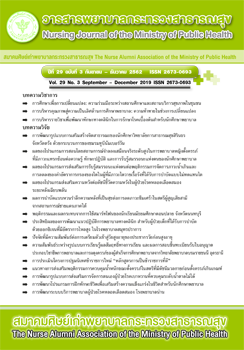The Effect of High-Fidelity Simulation Teaching Program on Student Nurses’ Knowledge, Skill, and Self-efficacy regarding Nursing Care for Pregnant Woman with Complication
Main Article Content
Abstract
Pregnancy with complications is considered abnormal and harmful to pregnant women and fetuses. Therefore, the nurses’ knowledge and skills in taking care of these patients are important. This quasi-experimental research using two group pre-posttest design aimed to compare knowledge, skills and self-efficacy of student nurses participating in a High-Fidelity Simulation Teaching Program in Nursing Care for Complications in Pregnant Woman. The sample consisted of 80 fourth year nursing students of the 46 batch studying in academic year 2018. The sample was randomly allocated to experimental group and control group 40 each. The experimental group participated in the High-Fidelity Simulation Teaching Program. The program consisted of a case study, high-fidelity simulation practice using a high-fidelity manikin in the situation of pregnancy induced hypertension, uterine rupture, fetal distress syndrome, umbilical cord prolapse and reflection. The control group underwent self-study. The research instruments consisted of Knowledge, Skills, Self-efficacy and Satisfaction questionnaires. The content validity of the instruments were tested; the CVI was .85-1.00. The results revealed that posttest mean scores of knowledge was not statistically significantly different between the experimental group and
control group (t=1.663, p>.05). Posttest mean scores of skills of the experimental group was statistically significantly higher than the control group (Z=-4.911, p<.01). Posttest mean scores of self-efficacy of the experimental group was statistically significantly higher than the control group (t= 2.746, p<.01). The experimental group had high level of satisfaction in the High-Fidelity simulation training program ( =4.48, SD±.43). Nursing institutes should implement this simulation program for teaching and training to enhance the knowledge, skills and self-efficacy of student nurses.
Article Details
บทความและรายงานวิจัยในวารสารพยาบาลกระทรวงสาธารณสุข เป็นความคิดเห็นของ ผู้เขียน มิใช่ของคณะผู้จัดทำ และมิใช่ความรับผิดชอบของสมาคมศิษย์เก่าพยาบาลกระทรวงสาธารณสุข ซึ่งสามารถนำไปอ้างอิงได้
References
2. Takenaka S, Matsuoka R, Maruyama D, Kawashima A, Koide K, Sekizawa A. Magnesium sulfate has an antihypertensive effect on severe pregnancy induced hypertension. Hypertension Research in Pregnancy 2016;4(1):11-5.
3. Vernekar M, Rajib R. Unscarred uterine rupture: a retrospective analysis. The Journal of Obstetrics and Gynecology of India 2016;66(S1):S51-4.
4. Kohli U, Singh S, Dey M, Bal HK, Seth A. Antenatal risk factors in emergency caesarean sections done for fetal distress. International Journal of Reproduction, Contraception, Obstetrics and Gynecology 2017;6(6):2421-6.
5. Sananpanichkul P. Update understanding and concepts of toxemia pregnancy. Journal of Prapokklao Hospital Clinic Medical Education Center 2015;32(4):364-76. (in Thai)
6. Ntlokonkulu ZB, Rula NM, Goon DT. Medium-fidelity simulation in Clinical readiness: a phenomenological study of student midwives concerning teamwork. BMC Nursing 2018;17(31):1-8.
7. Bandura A. Self-efficacy: The exercise of control. New York: W.H. Freeman and Company;1997. 8. Kolb DA. Kolb learning cycle. [Internet]. 1999.[cited 2019 July 14]. Available from: http://www.ldu.leeds.ac.uk/ldu/sddu_multimedia/images/kolb_cycle.gif
9. Jeffries PR, Rogers KJ. Theoretical framework for simulation design. In Jeffries PR.(Eds.), Simulation in nursing education: from conceptualization to evaluation, 1st ed. New York NY: National League for Nursing : 2007.
10. Faul F, Erdfelder E, Buchner A, Lang A. Statistical power analysis using G* Power 3.1: test for correlation and regression analysis. Behavior Research 2009;41(4):1149–60.
11. Kaewkanvan J, singhasivanon P. Textbook of Clinical Research: Chapter 4 Sample size in Clinical Research. [Internet]. 2011.[cited 2019 July 14]. Available from: http://www.tm.mahidol.ac.th..earh/107-44. (in Thai).
12. Pasunon P. Assessment of confidence between assessors using Kappa statistics. The Journal of Faculty of Applied Arts 2015;8(1):2-20. (in Thai)
13. Sanpasithiprasong College of Nursing. Bachelor degree Nursing Curriculum (Course Update 2012) Documents not published. (in Thai)
14. Awidia IT, Paynterb M. The impact of a flipped classroom approach on Student learning experience. Journal of Computers & Education 2019;128:269–83.
15. Li KC, Lee LY-K, Wong S-L, Yau I.S-Y, Wong B.T-M. The effects of Mobile learning for nursing students:an integrative evaluation of learning process, learning motivation, and study performance. International Journal of Mobile Learning and Organization 2019;13(1):1-3.doi: 10.1504/IJMLO.2019.096471
16. Hall SW. High-Fidelity Simulation for Senior Maternity Nursing Students. Nursing Education Perspectives 2016;36(2):124-6.
17. Franklin AE, Gubrud-Howe P, Sideras S, Lee CS. Effectiveness of Simulation Preparation on Novice Nurses’ Competence and Self-Efficacy in a Multiple-Patient Simulation. Nursing Education Perspectives 2015;36(5):324-325.doi:10.5480/14-1546
18. Young KM, Soohyun P, Jongsoon W. Influence of Nursing Students’ Anxiety during Simulation Training on Personal Satisfaction of Simulation, Self-efficacy, Clinical Competence. Journal of Korean Academy of Fundamentals of Nursing 2016;23(4):411-418. doi http://dx.doi.org/10.7739/jkafn.2016.23.4.411

